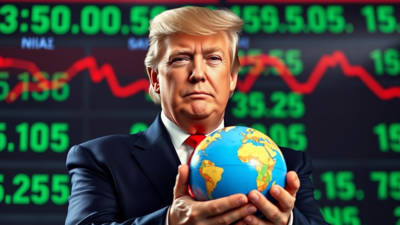Asian stocks jump after US markets hit record highs after tariff pause: 10 things to know – The Times of India

Asian markets surged on Thursday morning after US President Donald Trump paused most of his planned tariffs, sparking a wave of optimism among global investors. The relief rally followed a historic upswing on Wall Street, where major indices recorded some of their biggest gains in recent years.
“I have authorised a 90 day PAUSE,” Trump said, recognising around 75 countries that have been in talks with US over tariff and have not retaliated yet.
Trump pauses tariffs for most — but not China
Trump’s message on Truth Social declared a 90-day pause on new tariffs for most US trading partners, replacing them with a 10 per cent Reciprocal Tariff. However, China was excluded from this relief — with tariffs on Chinese goods hiked to 125 per cent.
‘Great time to buy,’ says Trump
In a series of posts, Trump encouraged Americans to stay calm and invest. “BE COOL!” and “THIS IS A GREAT TIME TO BUY!!!” he wrote, adding that fears over the economy had been overblown.
Wall Street posts a blockbuster day
On Wednesday, US markets posted stunning gains.
- The S&P 500 surged 9.5 per cent.
- The Dow Jones jumped nearly 2,500 points.
- The Nasdaq soared 12.2 per cent, its best day in 24 years.
The rally began after Trump’s tariff announcement hit social media.
Japan ‘strongly demands’ US to review other tariffs
Japan on Thursday welcomed Trump’s decision to pause reciprocal tariffs, calling it a positive step, but reiterated calls for Washington to reconsider other trade measures that continue to impact key Japanese industries.
“We received the latest US announcement positively,” chief government spokesman Yoshimasa Hayashi said, adding, “We continue to strongly demand that the United States reviews measures on its reciprocal tariffs, tariffs on steel and aluminium, and tariffs on vehicles and auto parts.”
Japan’s Nikkei jumps over 2,000 points
Leading the Asian rally, Japan’s benchmark Nikkei 225 skyrocketed 8.8 per cent to 34,510.86, gaining more than 2,000 points almost immediately after trading began. Within 15 minutes, it was already up 7.4 per cent, reflecting investor relief.
Australia’s ASX opens with strong gains
Australia’s S&P/ASX 200 index surged 6.3 per cent in early trade, reflecting the positive global sentiment following the tariff reprieve. The sharp rise came within the first 10 minutes of trading.
Taiwan tech stocks power rally
Taiwan’s Taiex index surged 9.2 per cent to 18,982.55. Tech giants TSMC and Foxconn jumped 10 per cent and 9.8 per cent, respectively, fueling a broader rally as optimism returned to the semiconductor and electronics sectors.
Hong Kong joins in the party
In early trade, Hong Kong’s Hang Seng Index climbed 2.69 per cent, adding 545.94 points to reach 20,810.43. The Shanghai Composite Index followed with a 1.29 per cent gain to 3,227.84. Both had been under pressure in recent sessions.
Thai stocks open 4.5% higher
Thailand’s stock market rallied sharply on Thursday morning, mirroring a broader regional upswing.
The benchmark SET Index surged 4.5 per cent in early trade, climbing 48.85 points to 1,137.03 shortly after the session opened. The jump comes after the US announced it would delay the imposition of a planned 36 per cent tariff on goods from Thailand, easing fears among investors about a potential hit to exports and economic growth.
France trims 2025 growth forecast amid trade uncertainty
Reacting to global volatility, France lowered its 2025 GDP forecast from 0.9 per cent to 0.7 per cent. Economy minister Eric Lombard said further revisions would depend on how trade negotiations unfold with the US.
Indian markets declined on Wednesday
Back home, Indian markets on Wednesday bucked the global trend. The Sensex slipped 379.93 points to close at 73,847.15, while the Nifty dropped 136.70 points to end at 22,399.15.
- The Sensex dropped 379.93 points to 73,847.15.
- The Nifty declined 136.70 points to 22,399.15.
The losses came despite the Reserve Bank of India cutting rates to cushion the economy from tariff-related pressures.




